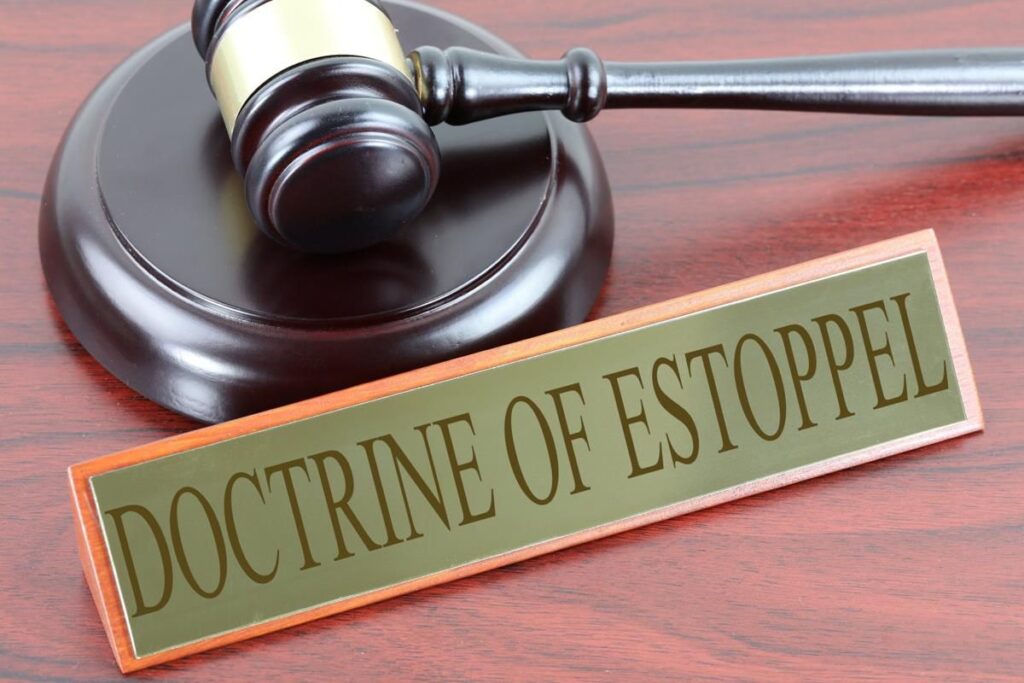Promissory Estoppel: Everything You Need To Know

A false remark that the court interprets as a promise is an example of promissory estoppel. In this case, the individual who made the fraudulent statement will be unable to reject it, so making their promise binding, also known as promissory estoppel. When a person relies in good faith on someone else’s statement, a judge will restrict the person who made the statement from disputing it.
When a certain sum of money is agreed upon or transferred, a contract becomes enforceable. To be genuinely fair, you may learn that a court will uphold the pledge even if no trade occurred. Simply, a promise must be made, and a significant loss must have resulted from reliance on this promise.
Promissory Estoppel Meaning
Promissory estoppel applies whilst the promisor has made a promise to the promisee. The promisee ought to have depended on the promise and suffered a loss because of the non-overall performance of the settlement. The doctrine prevents the promisor or employer from going return on their phrase or promise. The promissory estoppel is sometimes spoken of as a substitute for equitable doctrine.
For example, a supplier makes an oral promise to the patron to update the products in the event that they do now no longer in shape the patron length necessities. The patron purchases the garments and takes them home. However, the patron proposes to go back the garments to the seller counting on the seller’s oral promise. Here, the seller is stopped from refusing the garments returned.
The doctrine of promissory estoppel varies from country to country. The doctrine is a part of the regulation withinside the United States and different countries. The promise is enforceable without attention.
Read more: 15 Best Running Watches To Buy In 2021
What Is Promissory Estoppel?
Promissory estoppel is the criminal precept that a promise is enforceable with the aid of using regulation, despite the fact that made without formal attention whilst a promisor has made a promise to a promisee who then is predicated on that promise to his next detriment. Promissory estoppel is supposed to forestall the promisor from arguing that an underlying promise has to now no longer be legally upheld or enforced.
The doctrine of promissory estoppel is a part of the regulation withinside the United States and different countries, despite the fact that the suitable criminal necessities for promissory estoppel range now no longer most effective among countries, however additionally among exceptional jurisdictions, including states, withinside the equal country.
Principle of Promissory Estoppel
The following factors ought to be a gift for the doctrine of promissory estoppel to be enforceable:
1. Promisor Made a Tremendous Promise to Reason the Promisee to Behave On it
The first detail of promissory estoppel is that the promise made to the promisee becomes tremendous sufficient and that an inexpensive character could on the whole rely upon it.
2. Promisee Depended on the Promise
The second detail is that the promisee ought to have acted at the promise made with the aid of using the promisor, although it becomes now no longer supported with the aid of using attention.
3. Promisee Suffered Tremendous Harm With the Aid of Using Counting on the Promise
The third detail is that the birthday celebration counting on the promise suffered a real detriment withinside the shape of a monetary loss. The loss outcomes from the promissory failing to supply the promise made at the beginning of the relationship. In easy terms, the promisee is in a worse function for having acted on and depended on the promise.
4. Fulfillment of the Promise is the Most Effective Manner the Promisee May be Compensated
The fourth detail is that the promise will become enforceable if the courtroom docket determines that the most effective manner the injustice devoted to the promisee may be averted is with the aid of using imposing the promise. However, the courtroom docket has discretion in selecting what to do in one of these cases. Ideally, it’s going to take a movement that relieves the promisee of the detriment suffered.
Read more: What Are Interpersonal Skills And Why Do They Matter
Promissory Estoppel Example Case
Let’s say Mr. Smith has a settlement to create a movie. As such, he comes to a decision to rent an artist to color the set and has the same opinion to pay him a part of the profits.
If the artist is going directly to paint the whole set after which Mr. Smith well-known shows he in no way even had a settlement, and there are consequently no proceeds to share, the artist may also determine to sue him.
In this instance, a decide may also discover that Mr. Smith can’t deny he had a settlement with the painter, and the artist will possibly obtain a judgment imparting reimbursement for his work.
Promissory Estoppel In Contract Law

Contract regulation states that a celebration concerned wishes to collect attention in trade for making a settlement or promise. Lawful attention is a critical asset exchanged among the 2 events concerned in a promise or settlement, which is sort of a settlement.
Consideration presented may be withinside the shape of a promise to withhold a movement or a proposal of cash in order that the settlement can be enforceable in a courtroom docket of regulation.
To ensure justice or equity prevails, a courtroom docket of regulation may also uphold a promise even if there may be no attention gift. To be fair, it might be at the circumstance that the promise becomes moderately dependent upon, and the dependence on it might have ended in a few types of loss because of the promisor failing to honor his promise.
Promissory estoppel is an idea that states that a promise made may be upheld with the aid of using regulation if, after relying on that promise, the promisee studies damages of a few types.
The motive of promissory estoppel is so the promisor can’t argue that the basic premise, that is the idea of the case, has to now no longer be legally upheld. While promissory estoppel has criminal importance in all 50 states, the necessities coping with promissory estoppel fluctuate relying on the state.
Doctrine Of Promissory Estoppel In India

Estoppel refers to the rules of equality, fairness, and fairness. And in recent years this rule has expanded its scope. One of the classifications of estoppel was a bill of exchange estoppel recognized by national courts. In 1880, the estoppel concept of a promise originated in Indian law through the Ganges Manufacturing Company.
V. Surajmullah, the High Court of Calcutta, affirmed that unconsidered promises can only be fulfilled on the basis of interest and trust. In 1892, the judgment of the High Court of Calcutta was not enforced as the High Court of Madras rejected the grounds of interest and conviction, reverting to the traditional approach contemplated in Shulank V. Indian Evidence Law.
The person promised during the development period cannot challenge the principle of estoppel unless the parties are harmed. One obligation is for the other party to rely on promises and to act on the guarantees provided by the guarantor.
The only important requirement of this doctrine is to change the position of the party. The doctrine of debt estoppel found a full explanation in the example of the Indian Union V. Anglo-Afghan Institution.
Never before had the estoppel of the legislation applied to governments. However, over time, this event changed the situation. To boost exports of woolen clothing to Afghanistan, the government has declared certain changes to the import of certain raw materials.
However, only limited modifications were later allowed, and not all modifications were accepted as promised. The government was indicted by the Supreme Court as it was interrupted by their promise.
Thus, the court applied promissory note estoppel to the government. The promissory estoppel Indian contract act has been fully accepted without the notion of consideration and made familiar to the parties to whom the promise was made as a basis for action.
Promissory Estoppel Against Government
The Indian estoppel principle is a rule of evidence contained in section 115 of the Indian Evidence Act of 1872. The section states, “Where a person, by means of a statement, act or omission, causes another to believe that it is true or to act on that belief, he and his agent are not admissible to any claim. or a legal proceeding between him and such person or his agent to deny the truth of this case.”
Essential Characteristics for Making Promises to Government
The following are the basic elements of any promise to the government:
1. The government makes promises within the law
2. Is willing to enter into a legal relationship
3. The other party must act in accordance with this promise, otherwise, any action is prohibited.
Promissory Estoppel In Administrative Law
The estoppel principle of Bill is a fair principle. As with all equitable remedies, they are voluntary and contrary to absolute common law rights, such as the right to damages in case of breach of contract. Principles-based on fairness to avoid injustice, commonly referred to as “debt estoppels,” but do not apply to contracts or estoppels.
However, since in India the estoppel rule is a rule of proof, the elements of section 115 of the Indian Evidence Act 1872 of 1872 must satisfy the application of that doctrine. Because this section refers to statements relating to existing facts, while estoppels refer to promises of the future.
The application of this principle would overturn the provisions of the Constitution that exempt the person making a promise or guarantee from personal liability, as in section 299.
Read more: A Step By Step Guide On How To Change App Icons For iPhone
Difference Between Estoppel And Promissory Estoppel
Escalation of the bill of exchange is the basis of a claim that a party may bring against a party because of the fact that it has maliciously relied on an arrangement. another party. Fair estoppel is a defense of one party’s claim.
In case of justifiable estoppel, the party making the estoppel will defend it based on statements of fact past or present. An estoppel promissory note states the other party’s future intentions.
The estoppel itself is used to prevent one party from promising one thing and then change the situation after the other relies on the promise. The estoppel of the measure allows a party to be harmed because it relied on certain promises or statements to indemnify them. For estoppel bills, the promise must be specific.
Statements may be expressed in words or deeds in fair estoppel order. A party who is obligated to speak but is unable to speak actually speaks in silence. The party giving the presentation wants the other party to rely on it.
Final Thoughts
A person cannot live in isolation during social life. They are all dependent on each other. This has resulted in contractual and commercial relationships. For protection, long-term esoteric doctrine can be used as a shield because when one person’s promise becomes important to another, and for-profit or loss, rejecting it can harm another.
An estoppel promissory note is a good safeguard and a good principle to avoid injustice. India’s judiciary has played a very important role in making promises accountable and fulfilling promises.
